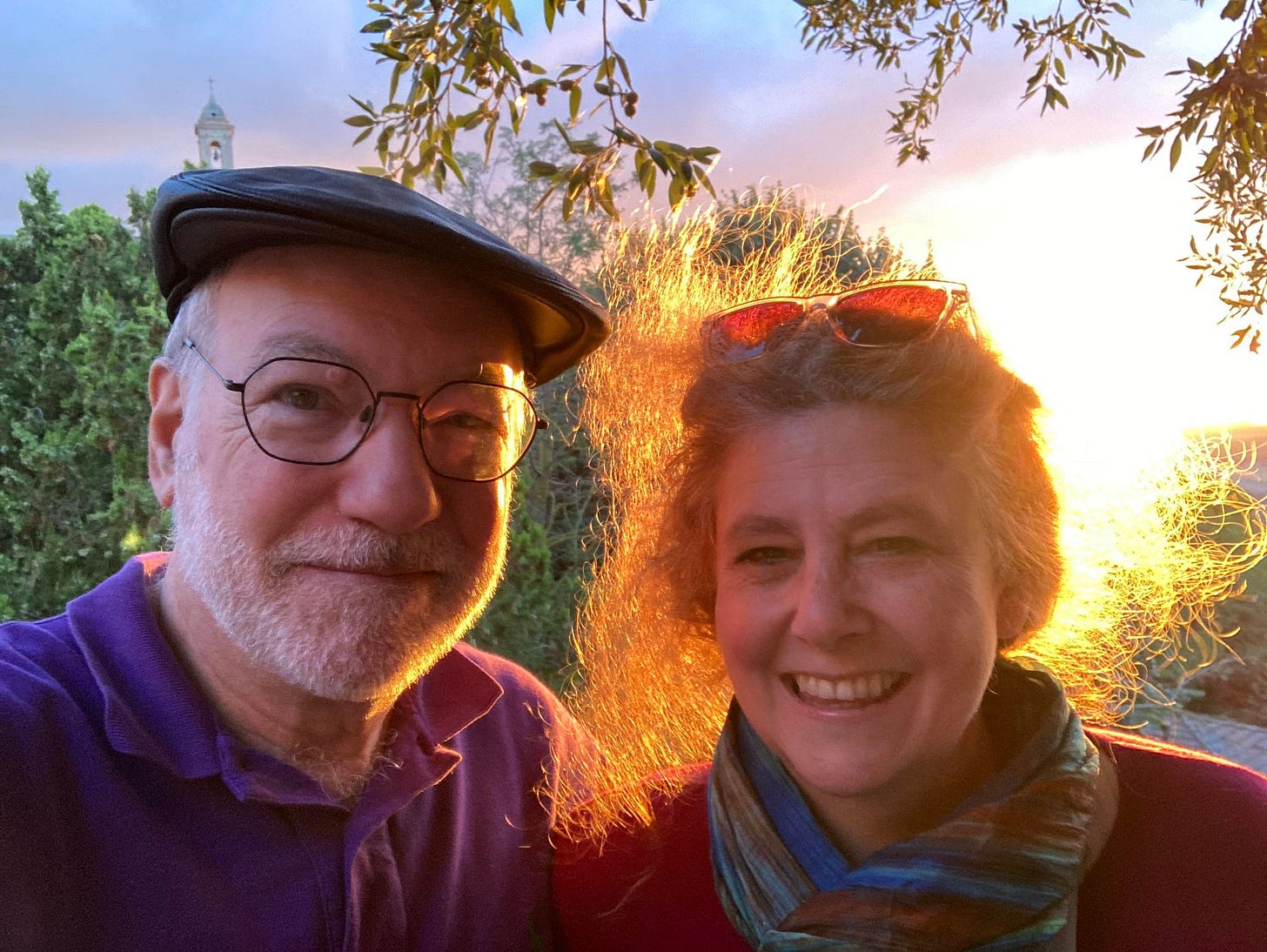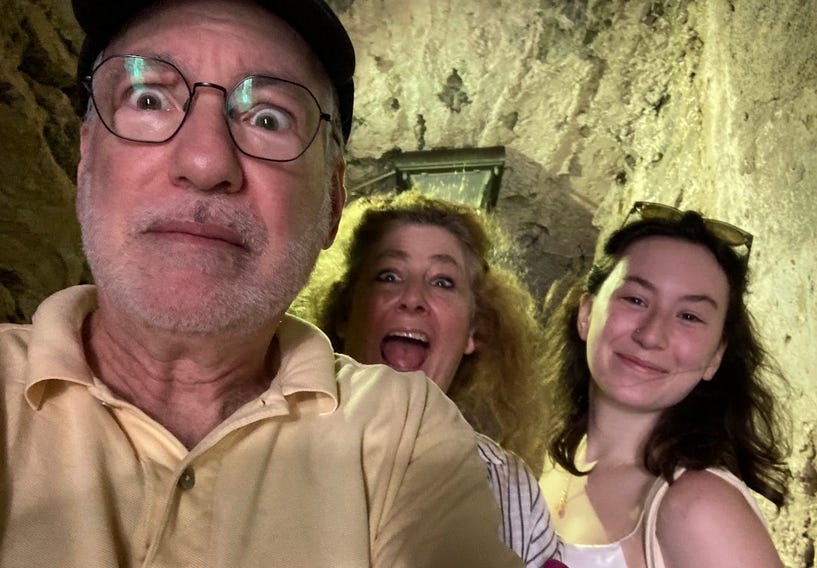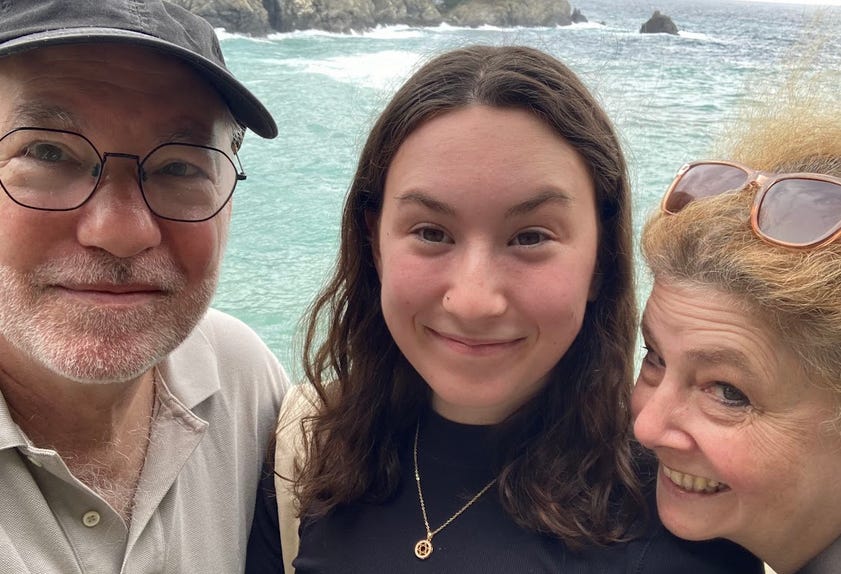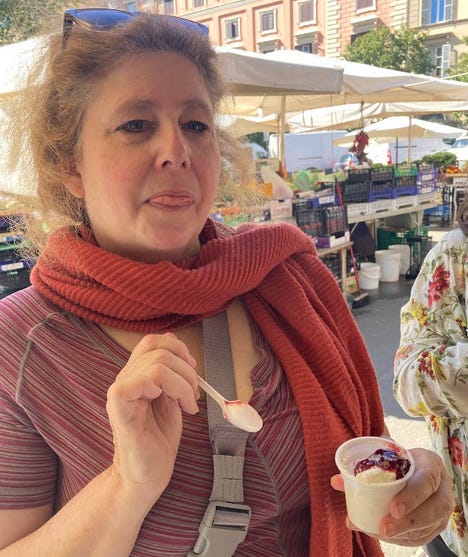Travel is Completely Different Now
Two non-nomad friends of ours recently took a trip to Italy — and learned that travel in 2024 is nothing like it used to be. But that doesn't mean they didn't have a great time.
Thanks to technological changes, travel is easier now than in all of human history.
Overall, people in 2024 are much wealthier too — with much more “disposable income” to spend on themselves. And while we all like to complain about rising prices, when adjusted for inflation, travel is now as cheap as it’s ever been.
As a result — not surprisingly! — more people are traveling than ever before.
Together and apart, Michael and I have been traveling for forty years — and as nomads, we’ve been traveling continuously since the end of 2017. So we’ve seen these changes up close.
We both agree that many aspects of the travel experience have improved greatly, even though some have worsened.
But we’re often curious how more infrequent travelers see the state of travel in 2024.
James and Marcy, two long-time friends from our old life back in America, recently took a trip to Italy. They’re experienced travelers, but this was the first time they’d traveled to Europe together.
Their observations about their trip to Italy mirror much of what Michael and I see all over the world. They also offer some interesting advice that all modern-day travelers should consider.
In tourist hot spots, the crowds can be absolutely insane.
In Italy, James and Marcy visited Rome, the Cinque Terre, Sienna, Montepulciano, and another town they’re declining to mention for reasons that will soon become clear.
They saw massive crowds almost everywhere.
“A lot of the major cities in Italy have been RickSteves-ified,” James says. And Marcy adds, “They’re turning into Disneyland.”
“We’d read about overtourism,” James says, “but we had a fantasy in our head that if we avoided the student travel times, we’d be okay. But we didn’t count on the high levels of older tourists — primarily American — who are now apparently everywhere, all the time.”
Michael and I have had the same experience. Whenever we visit a trendy big city or major tourist destination, especially in Western Europe, we’re usually shocked by the crowds.
It can be bonkers — nothing like how these destinations are portrayed in romantic travel movies or, frankly, on Instagram.
James and Marcy both agree that enjoying major tourist attractions in 2024 means getting an early-morning start, reserving slots for everything as far in advance as possible and, if you can afford it, paying for premium “skip the line” tickets.
But they also say that a city like Rome is so massive that there are still plenty of places to escape the crowds.
At popular destinations, there might not be a shoulder season.
Like most travel writers, Michael and I have long recommended traveling in the shoulder seasons — before or after the massive hordes of the high season descend.
But even when we take our own advice, we’ve still been confronted by massive crowds. Last year, we visited Amsterdam in late November, and it was like being in a mosh pit. The front desk clerk at our hotel told us, “Amsterdam doesn’t have a shoulder season anymore.”
It was the same two years ago in Prague in October, although the crowds finally tapered off midway through November when the cold weather hit.
“We were at the Cinque Terre in late September,” Marcy says, “and it felt like we were there in July. I can’t imagine what July would be like! So the shoulder season is now November through March or April? The old low season?”
“Each of the towns had the same shops, the same layout,” James adds. “And we were crawling over people in the streets.”
In a way, the crowds make sense. More people are traveling than ever, but the five villages of the Cinque Terre aren’t getting any bigger. On the contrary, they’re charming and unique, and the whole point is to preserve them precisely the way they are.
It’s the same for attractions like the Versailles in Paris, the Blue Mosque in Istanbul, or Machu Picchu in Peru. The fact that these places are one-of-a-kind is exactly what makes them unique.
But if these places themselves are mostly unchanged, the unrelenting crowds definitely alter people’s impressions of them.
“James wanted to stay in one of the towns of the Cinque Terre because it was great on a trip he made 32 years ago,” Marcy says. “But it’s a totally different experience now. Our advice is don't assume anything is like it was more than five years ago. Do your research on what things are like now.”
Is it tacky to point out here that when James and Marcy were planning their trip, Michael and I specifically told them that the Cinque Terre would be utterly mobbed in September?
“I know, I know,” Marcy admits. “We should have listened to you.”
Tourism is negatively impacting local communities.
James and Marcy were also taken aback by the obvious impact the crush of tourists was having on local Italians.
“In the food tour we did in Trastevere, the tour guide told us that the street markets are gradually drying up because the Romans are moving out,” James says. “They can’t afford the cities, or it’s too hard to get around due to so many tourists. Our Airbnb host in Siena said the same thing was happening in Florence and now in Siena too. And so many apartments are being turned into Airbnbs, we seriously question whether we should stay in them anymore.”
“We met some very nice Italians,” Marcy adds. “But my impression is that Italians are sick of Americans. I don't blame them. We’re everywhere. When I traveled before the pandemic — in The Netherlands and Germany — and in my previous European travels, there was always some curiosity about where you came from and why you were there. Not now.”
On the plus side, Marcy says, “Italians are all gorgeous all the time. But alas, they have not yet given up smoking.”
On the subject of a general tourist-backlash, Michael and I see this too. There’s a reason why Spaniards are currently making headlines by protesting and sometimes even harassing tourists: the locals are losing control of their own cities.
I’ve written before about how I think the economic impact of tourism is more complicated than many online critics admit. The fact is, as often as locals in Western Europe have complained to us about overtourism, locals in less-touristed places have told us how their communities have benefited, creating vibrant middle classes and even dramatically reducing child poverty.
But the issue is less complicated in overtouristed destinations like Italy: there’s clearly been too much change too fast.
Which leads me to James and Marcy’s next observation, which also explains why they’re choosing not to publicly reveal their full itinerary…
Travel becomes very different if you go just a bit off the beaten path.
James is of Italian heritage, and part of his trip with Marcy included a visit to his father’s hometown.
“We thought it would be a shitty suburb, and it was a gorgeous medieval town,” Marcy says. “It had a wonderful town square, and old fort, and best of all, there were no tourists. That’s why we're not saying the name of it. We don’t want it to become an Instagram hotspot.”
“It was one of the best experiences of our trip to Italy,” James agrees.
“Sienna was also a lot more manageable,” Marcy says. “There were tourists there, but nothing like in Rome or the Cinque Terre.”
This, too, is exactly Michael’s and my experience. While we’re often shocked by the crowds at popular tourist destinations and attractions, we’re usually equally shocked by how uncrowded the lesser-known attractions and second or third-tier cities are. These places also still have very clearly defined shoulder and low seasons.
This is one big advantage to nomading, or “slow travel.” It gives us the benefit of seeing both the Big Sights, at least for short stays, but then we can settle down for longer periods in local communities and see how other people in other cultures actually live. The locals in these places are also much more receptive to visitors, usually welcoming us with open arms.
Sometimes, as in Prague or even Amsterdam, it’s simply a question of staying outside the tourist center. On our many trips to Italy, we’ve also found many lovely, quiet spots like James’ father’s hometown.
“Italy is a beautiful country with so much history and culture,” Marcy says. “Wherever you go, be respectful. But we think you should also try to find out-of-the-way places.”
It’s true for Italy — but it’s also true for the whole world.
Subscribe to Marcy’s newsletter here.
See also:
Travel Tips for Italy's Cinque Terre (From a Guy Who Loves Bargains and Hates Crowds)
Seven Surprising Things About Lake Como, Italy
The Secrets of Picking the Best Gelato
Brent Hartinger is a screenwriter and author. Check out my new newsletter about my books and movies at BrentHartinger.com.






I’m SO glad we got to see many of these places back in the 70s, 80s, and 90s. Even in non-European countries it’s getting so bad. In 2018, we hiked the Inca Trail in Peru. There were hardly any people on the trail and it was spectacular. We were shocked when we arrived at Machu Picchu and saw the crowds. Not just crowds but badly-behaved crowds. Someone was flying a drone (strictly prohibited) and the poor rangers were trying to find them. We saw a woman with a biscuit in her mouth trying to convince a llama to take it…out of her mouth! Machu Picchu was the main reason we went to Peru and it sunk way down on my list of favorite sites. We went to Sri Lanka in February thinking there would be less tourists there. While it wasn’t at European levels, I was surprised at the number of tourists (very few Americans though). Costco is now offering a trip to Sri Lanka so expect it to get bad! 😂 Sorry for the rant—I still love to travel!
This summer, my husband and I had to change our (domestic) travel plans suddenly because our original destination closed due to wildfires. We decided to go to the Northwest coast, but I thought we would never be able to get reservations in August in shore towns on only a week's notice. To my shock, we not only had no problem getting nice rooms, but the beaches had plenty of room, the streets were busy but not insane, and we were able to eat in any restaurant without reservations (though we are early eaters). The parks were mostly uncrowded; at one wildlife refuge, we saw exactly one other hiker. I thoroughly savored the experience because, as I said to my husband, "How long can this last? I wonder if these towns will be 'discovered' soon and, in a few years, be totally overrun and unrecognizable?" It feels like travel is often the experience of just trying to stay one or two steps ahead of the crowds.